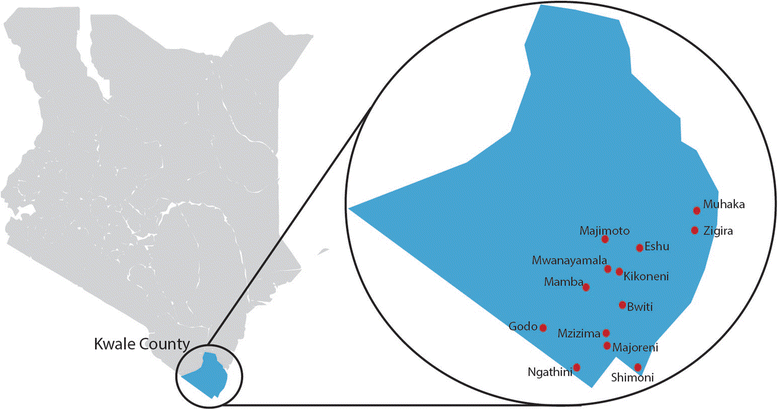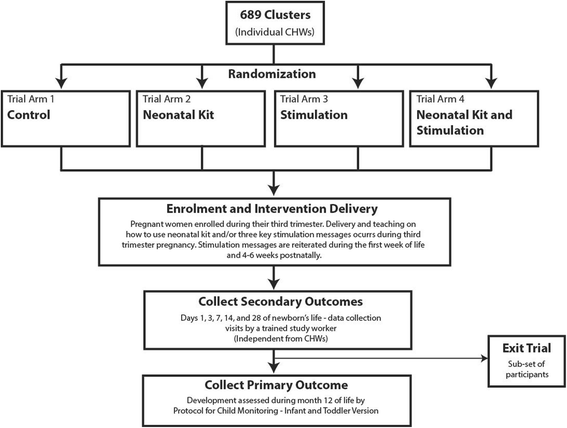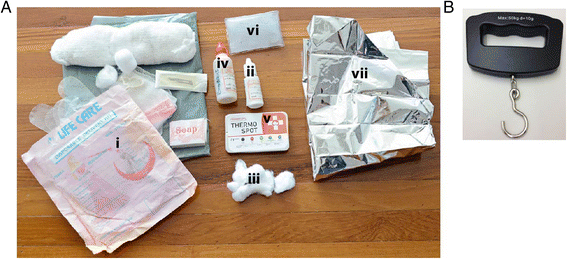Effect of provision of an integrated neonatal survival kit and early cognitive stimulation package by community health workers on developmental outcomes of infants in Kwale County, Kenya: study protocol for a cluster randomized trial
- PMID: 27608978
- PMCID: PMC5016984
- DOI: 10.1186/s12884-016-1042-5
Effect of provision of an integrated neonatal survival kit and early cognitive stimulation package by community health workers on developmental outcomes of infants in Kwale County, Kenya: study protocol for a cluster randomized trial
Abstract
Background: Each year, more than 200 million children under the age of 5 years, almost all in low- and middle-income countries (LMICs), fail to achieve their developmental potential. Risk factors for compromised development often coexist and include inadequate cognitive stimulation, poverty, nutritional deficiencies, infection and complications of being born low birthweight and/or premature. Moreover, many of these risk factors are closely associated with newborn morbidity and mortality. As compromised development has significant implications on human capital, inexpensive and scalable interventions are urgently needed to promote neurodevelopment and reduce risk factors for impaired development.
Method/design: This cluster randomized trial aims at evaluating the impact of volunteer community health workers delivering either an integrated neonatal survival kit, an early stimulation package, or a combination of both interventions, to pregnant women during their third trimester of pregnancy, compared to the current standard of care in Kwale County, Kenya. The neonatal survival kit comprises a clean delivery kit (sterile blade, cord clamp, clean plastic sheet, surgical gloves and hand soap), sunflower oil emollient, chlorhexidine, ThermoSpot(TM), Mylar infant sleeve, and a reusable instant heater. Community health workers are also equipped with a portable hand-held electric scale. The early cognitive stimulation package focuses on enhancing caregiver practices by teaching caregivers three key messages that comprise combining a gentle touch with making eye contact and talking to children, responsive feeding and caregiving, and singing. The primary outcome measure is child development at 12 months of age assessed with the Protocol for Child Monitoring (Infant and Toddler version). The main secondary outcome is newborn mortality.
Discussion: This study will provide evidence on effectiveness of delivering an innovative neonatal survival kit and/or early stimulation package to pregnant women in Kwale County, Kenya. Study findings will help inform policy on the most appropriate interventions for promoting healthy brain development and reduction of newborn morbidity and mortality in Kenya and other similar settings.
Trial registration: ClinicalTrial.gov NCT02208960 (August 1, 2014).
Keywords: Child development; Community health workers; Kenya; Neonatal mortality; Stimulation.
Figures



References
-
- Stenberg K, Axelson H, Sheehan P, Anderson I, Gulmezoglu AM, Temmerman M, Mason E, Friedman HS, Bhutta ZA, Lawn JE, et al. Advancing social and economic development by investing in women’s and children’s health: a new Global Investment Framework. Lancet. 2014;383(9925):1333–54. doi: 10.1016/S0140-6736(13)62231-X. - DOI - PubMed
-
- Engle PL, Fernald LC, Alderman H, Behrman J, O’Gara C, Yousafzai A, de Mello MC, Hidrobo M, Ulkuer N, Ertem I, et al. Strategies for reducing inequalities and improving developmental outcomes for young children in low-income and middle-income countries. Lancet. 2011;378(9799):1339–53. doi: 10.1016/S0140-6736(11)60889-1. - DOI - PubMed
Publication types
MeSH terms
Associated data
LinkOut - more resources
Full Text Sources
Other Literature Sources
Medical
Research Materials

